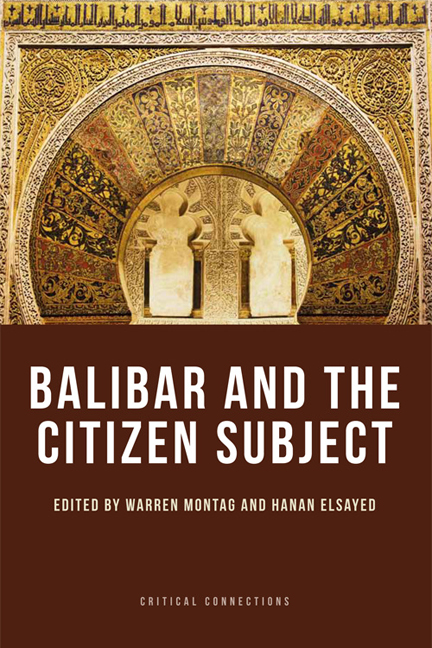Book contents
- Frontmatter
- Contents
- Introduction: Balibar and the Citizen Subject
- Part I Balibar Reading Schmitt Reading Hobbes: Equality or Similitude?
- Part II Transindividual/Universal
- 3 The “Other Scene” of Political Anthropology: Between Transindividuality and Equaliberty
- 4 Intersubjectivity or Transindividuality: The Leibniz– Spinoza Alternative
- 5 A Parallelism of Consciousness and Property: Balibar's Reading of Locke
- 6 Figures of Universalism: Notes on Philosophy and Politics in Etienne Balibar
- 7 Balibar and the Philosophy of Science: The Question of the “Epistemological Break”
- Part III Inequality, Violence and the Possibility of Citizenship
- Notes on Contributors
- Index
4 - Intersubjectivity or Transindividuality: The Leibniz– Spinoza Alternative
from Part II - Transindividual/Universal
Published online by Cambridge University Press: 10 January 2018
- Frontmatter
- Contents
- Introduction: Balibar and the Citizen Subject
- Part I Balibar Reading Schmitt Reading Hobbes: Equality or Similitude?
- Part II Transindividual/Universal
- 3 The “Other Scene” of Political Anthropology: Between Transindividuality and Equaliberty
- 4 Intersubjectivity or Transindividuality: The Leibniz– Spinoza Alternative
- 5 A Parallelism of Consciousness and Property: Balibar's Reading of Locke
- 6 Figures of Universalism: Notes on Philosophy and Politics in Etienne Balibar
- 7 Balibar and the Philosophy of Science: The Question of the “Epistemological Break”
- Part III Inequality, Violence and the Possibility of Citizenship
- Notes on Contributors
- Index
Summary
Monadology and Spinozism
Among the most curious and insistent features in the history of misunderstandings of Leibniz's philosophy is the attempt to see within it a form of Spinozism. This is a misunderstanding in a double sense, because in order to affirm it, the complexity of Spinoza must be reduced to the same extent as the complexity of Leibniz. Already in the final years of his life, Leibniz had unequivocally expressed the problem with such a reduction in response to a letter from Louis Bourguet:
I do not see how you can deduce any Spinozism from this; to do so is to jump to conclusions. On the contrary, it is through these very monads that Spinozism is destroyed, for there are just as many true substances, as many living mirrors of the universe which subsist always, or as many concentrated universes, as there are monads; according to Spinoza, on the contrary, there is only one substance. He would be right if there were no monads; then everything except God would be of a passing nature and would vanish into simple accidents or modifications, since there would be no substantial foundation in things, such as consist in the existence of monads.
Leibniz's response grasps the fundamental point of divergence between the two philosophies, which Balibar, using a fine expression of Foucault's, has defined as their “point of heresy.”
On a strictly metaphysical level, it is Jacobi who took up the opposition between the two systems: the presence of the concept of substantial form in Leibniz, a principium individuationis, renders the two systems not only different but opposed. This opposition was at once canonized and dialecticized by Hegel in the Remark to the third section of chapter one in the Doctrine of Essence5: here the Leibniz–Spinoza opposition loses the contingent characteristics of its historical horizon in order to become a categorical game that the mind of God conducts in the eternity of the logical element.
- Type
- Chapter
- Information
- Balibar and the Citizen Subject , pp. 132 - 156Publisher: Edinburgh University PressPrint publication year: 2017



